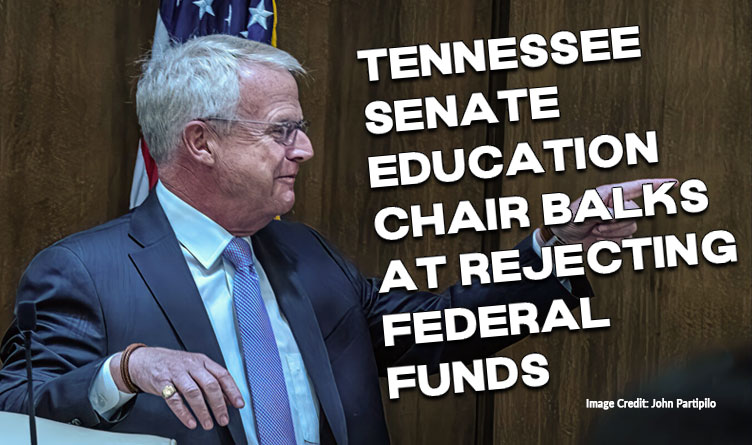Image: Sen. Jon Lundberg, R-Bristol, gestures to a colleague during a legislative hearing on Nov. 7, 2023. Image Credit: John Partipilo
By Sam Stockard [Tennessee Lookout -CC BY-NC-ND 4.0] –
The Tennessee Senate’s Education Committee chairman opposes turning down at least $1.3 billion in federal education funds but says the state could seek some sort of waiver on federal school requirements.
After a week of hearings before a committee designed to study the question, Sen. Jon Lundberg says he doesn’t believe the state should reject the funds but that it could continue to look at federal and state regulations on districts and schools. Tennessee received $1.8 billion this year from the federal government, but a large chunk of that is expected to disappear now that COVID-19 pandemic funding is gone.
“There are interesting things to follow on and discuss. One of the interesting ones would be seeking waivers, much like we do on our Medicaid block grant,” Lundberg, a Bristol Republican, says. “If we were going to do something that way, if we’re not rejecting federal funds, we’re just seeking a waiver and still utilizing those funds, just letting the state do it.”

For instance, the federal government has a broad requirement for a testing program, which the state administers as the Tennessee Comprehensive Achievement Program. Lundberg, however, says it’s premature to say what type of waiver the state might request.
The committee appointed by House Speaker Cameron Sexton and Lt. Gov. Randy McNally wasn’t charged with delving into testing and other state regulations, but Lundberg says taking a “look in the mirror” could be the next step.
Sexton was the driving force behind the idea of rejecting federal funds, saying earlier this year the state should consider replacing those federal funds with its own money to avoid federal mandates. He never pinpointed which federal regulations he thought the state should avoid.
Other Republican leaders warned that if the state were to forego the money, Tennessee taxpayer dollars would go to other states.
Federal funds are used mainly to support low-income students, English language learning and disabled children, in addition to rural education and charter school technology.
McNally notes the panel’s main job was “fact-finding” and that the hearings “served that mission.”
“The group heard from a wide variety of education stakeholders and experts who have given members and the public a more comprehensive view of how federal dollars interact with Tennessee’s education system,” McNally says in a statement.
The working group was to present a report Jan. 9, but it is likely to take longer, according to Lundberg.
Critics of the panel say it didn’t allow parent groups to speak at the hearings but that it heard from two conservative groups, the Center for Practical Federalism and The James Madison Institute, invited by co-chairman Rep. Debra Moody, R-Covington, on the final day. All senators serving on the panel missed the last session because of schedule conflicts.
Lundberg says he didn’t allow parents to speak because he didn’t want the hearings to turn into a defense of education programs, none of which the panel is considering cutting.
Mariam Abolfazl, a spokesperson for Rise and Shine Tennessee, says the hearings appeared to be a “witch hunt for inefficiency” to justify rejecting the funds. For example, Rep. John Ragan, R-Oak Ridge, complained about food waste, and others questioned administrative costs. Rise and Shine is an outgrowth of Covenant School parents motivated to advocacy by this year’s mass shooting.
“They were looking for this big ah-hah moment where it was like, ‘Oh, millions are being thrown out the door.’ And that never happened,” Abolfazl says.
In fact, the Department of Education testified that only 8% of federal funding goes toward administrative costs.
In the wake of the hearings, the group’s main contention is that protections for children should never be removed, Abolfazl says. She adds that one objection for state Republicans could be a directive by the Biden Administration dealing with LGBTQ students.
Senate Democratic Chairman Raumesh Akbari and Democratic Rep. Ronnie Glynn of Clarksville missed all sessions last week because of commitments. Both adamantly oppose rejecting federal funds and replacing them with state dollars.

During the first week of hearings, school directors from rural Hawkins County and Memphis-Shelby County told the group they are desperate for funding and said if the state has extra money it should provide those funds to schools in addition to the federal funds.
The Hawkins County director explained that he had to ask his county commissioners for a tax increase to replace the roofs on two schools.
Likewise, the Memphis-Shelby County Schools director described how students are attending class in century-old schools because the district doesn’t have the money to build new ones.
In light of those comments, Glynn said lawmakers should be discussing other matters and called the proposal a “mistake” and “a bad idea.”
“They shouldn’t have to depend on raising taxes to educate our children,” Glynn says. “Instead of replacing federal dollars, we should take the money these Republicans claim to be sitting on and invest it in our teachers, students and school infrastructure needs.”
Glynn also says a representative of the National Conference of State Legislatures confirmed that other federal funds could be withheld if Tennessee refuses to take education funds, a note that raised concerns for him because Montgomery County receives $1 million in Department of Defense funds.
Lawmakers heard from the Office of Research and Education Accountability, The Sycamore Institute, National Conference of State Legislatures, Tennessee Board of Education and Fiscal Review.
The U.S. Department of Education was supposed to testify but was left out of the hearings because of a miscommunication, according to Lundberg.


About the Author: Sam Stockard is a veteran Tennessee reporter and editor, having written for the Daily News Journal in Murfreesboro, where he served as lead editor when the paper won an award for being the state’s best Sunday newspaper two years in a row. He has led the Capitol Hill bureau for The Daily Memphian. His awards include Best Single Editorial from the Tennessee Press Association. Follow Stockard on Twitter @StockardSam




3 Responses
So what do all those opposed to ending our reliance in federal funding think is going to happen when the federal government is eventually forced to make serious cuts to spending? The responsible thing to do now is to start weaning our state off federal dollars and education is the best place to start. All of the concerns raised are state responsibilities not federal. In many cases they are family responsibility not state. Our state GOP loves to brag about how fiscally responsible they are while tied to the Titanic. As for other states getting the money that we don’t take they also get the chains that come with that money. A state that places higher value on federal dollars than keeping the federal filth away from our kids will never be a free state.
Dave Vance has written a well thought out response. The only thing I would add is the it’s natural that education heads would be against the refusal of federal funds because they would then become more accountable to Tn. taxpayers.
He is probably a Democrat and loves for the Fed. Gov. to control all the money and what is taught thru blackmail funds. CUT him out and Fed. Funds Plus these WOKE Teachers Unions and our children would actually be better off and learn something besides Garbage.